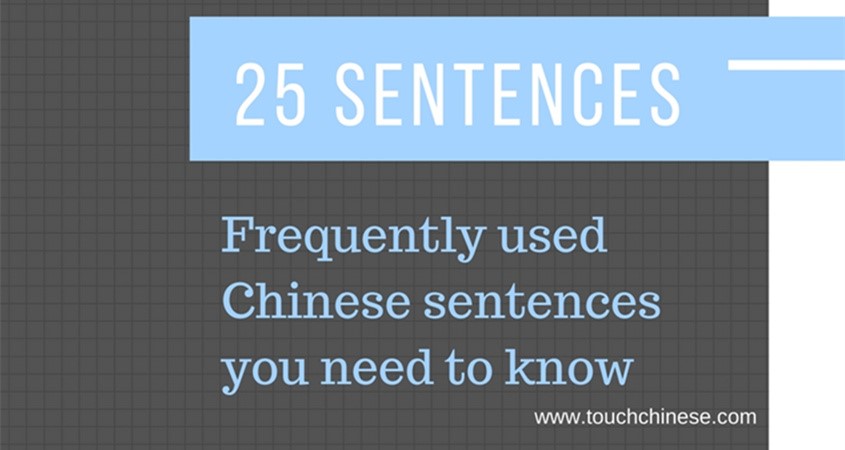In this article, we will focus on some frequently used Chinese sentences, which are particularly useful for people who have just started to learn Chinese or who want to travel to China. These sentences will come in handy, are simple and basic, and may help you survive certain social situations. We’ve divided them into 6 main types of sentences:
Type 1. New Things
When you want to know something new and how to expressit in Chinese, you can say:
1. 这是什么?(Zhèshìshén me?)What’s this?
2. 这个用汉语怎么说?(Zhèɡeyònɡhànyǔzěnmeshuō?) How do you say this in Chinese?
E.g.
A:这是什么?(Zhèshìshěnme?)What’s this?
B: 这是苹果。(Zhèshìpínɡɡuǒ.)This is an apple.
A: 这个用汉语怎么说?(Zhèɡeyònɡhànyǔzěnmeshuō?)How to say this in Chinese?
B: 茶。(Chá.) Tea.
Type 2. Asking for pardon and how to answer questions
Pardon:
When you can’t understand or can’t hear clearly what others say to you, you can ask:
3. 不好意思,你可以讲慢点吗?(Bùhǎoyìsi, nǐkěyǐjiǎnɡmàndiǎnmɑ?)
Excuse me, could you say it slowly?
4. 不好意思,你可以再说一遍吗?(Bùhǎoyìsi, nǐ kěyǐzàishuō yíbiànmɑ?)
Excuse me, could you say it again?
E.g.
A: 你们应该一直走,再左拐,再右拐,就是博物馆了。
(Nǐmenyīnɡɡāiyìzhízǒu, zàizuǒɡuǎi, zàiyòuɡuǎi, jiùshìbówùɡuǎn le.)
You should go straight, turn left, then turn right, and the museum is here.
B: 不好意思,你可以讲慢点吗?/不好意思,你可以再说一遍吗?
(Bùhǎoyìsi, nǐ kěyǐjiǎnɡmàndiǎnmɑ?/ Bùhǎoyìsi, nǐ kěyǐzàishuō yíbiànmɑ?)
Excuse me, could you say it slowly?/ Excuse me, could you say it again?
Answers:
When you are asked to do something, you can say:
5. 好的。(Hǎode.) Ok.
6. (不)行。((Bù)xínɡ.)No./Ok.
7. 可以。(Kěyǐ.) Of course./Ok.
8. 没问题。(Méiwèntí.) No problem.
E.g.
A: 你能帮我拿一下包吗?(Nǐnénɡbānɡwǒnáyíxiàbāomɑ?)Can you help me take the bag?
B: 可以。/不行。(Kěyǐ. /Bùxínɡ.)Of course./ No.
(when using “能”(néng) to construct a question, its answer usually uses “可以” (kěyǐ) for affirmative form or “不行”(bùxíng) for negative form.)
A: 你去拿一下签证吧。(Nǐqùnáyíxiàqiānzhènɡbɑ.) Can you go to take the visa?
B: 没问题。/行。/好的。(Méiwèntí. /Xínɡ./Hǎode.)No problem./ Ok./ Ok.
When someone inquiries something of you or asks answers from you, you can say:
9. 我不知道。(Wǒbùzhīdào.) I don’t know.
10. 不好意思,我听不懂。(Bùhǎoyìsi, wǒtīnɡbudǒnɡ.) Sorry, I don’t understand.
11. 不好意思,你刚才说的我没听清。(Bùhǎoyìsi, nǐɡānɡcáishuōdewǒméitīnɡqīnɡ.) Sorry, I didn’t hear what you said clearly.
E.g.
A: 请问,博物馆怎么走?(Qǐnɡwèn, bówùɡuǎnzěnmezǒu?)Excuse me, how to go to the museum?
B: 我不知道。(Wǒbùzhīdào.)I don’t know.
A: 你要去首都国际机场吗?(NǐyàoqùShǒudūɡuójìjīchǎnɡmɑ?)
Do you want to go to the Capital International Airport?
B: 不好意思,我听不懂。/不好意思,你刚才说的我没听清。
(Bùhǎoyìsi, wǒtīnɡbudǒnɡ./Bùhǎoyìsi, nǐɡānɡcáishuōdewǒméitīnɡqīnɡ.)
Sorry, I don`t understand. / Sorry, I didn`t hear what you said clearly.
When you want to give advice or express helplessness, you can say:
12. 算了。(Suàn le.) Let it be./Well.
E.g.
A: 他们还不来火车都要开了。(Tāmenháibùláihuǒchēdōuyàokāi le.)
The train will depart but they still are not here.
B: 算了,我们先上车吧。(Suàn le, wǒmenxiānshànɡchēbɑ.)
Let it be, let’s get on the train first.
A: 你不继续参加比赛了?(Nǐbújìxùcānjiābǐsài le?)
Don’t you want to continue your contest?
B: 算了,我肯定得不了奖。(Suàn le, wǒkěndìnɡdébùliǎojiǎnɡ.)
Well, I can’t win any prize.
Type 3. Needing Things
When you want or don’t want something in a shop or supermarket, you can say:
13. 我想要……(Wǒxiǎnɡyào….)I want….
14. 我不想……(Wǒbùxiǎnɡ ….) I don’t want….
(mainly use the structure: 我不想+verbal phrases)/我不要……。(Wǒbúyào….)
E.g.
A: 你好,我想要面包和牛奶。(Nǐhǎo, wǒxiǎnɡyàomiànbāohéniúnǎi.)Hi, I want bread and milk.
B: 好的。(Hǎode.)OK.
A:你想吃什么?(Nǐxiǎnɡchīshénme?)What do you want to eat?
B: 我想要吃蔬菜,不想吃肉。(Wǒxiǎnɡyàochīshūcài, bùxiǎnɡchīròu.)
I want to eat vegetables, I don’t want to eat meat.
A: 你喝什么?(Nǐhēshěnme?)What do you want to drink?
B: 我想要咖啡,不要放糖。(Wǒxiǎnɡyàokāfēi, búyàofànɡtánɡ.)I want coffee, no sugar.
Type 4. Paying and Bargaining
When you want to know the price of something, you can say:
15. 多少钱?(Duōshǎoqián?)
How much money?
16. 一共多少钱?(Yíɡònɡduōshǎoqián?)
How much in total?
l For bargaining, you can say:
17. 太贵了,便宜点。(Tàiɡuì le, piányidiǎn.)
Too expensive, could it be cheaper?
18. 打折吗?(Dǎzhémɑ?)
On discount?
l For paying, you can say:
19. 可以用支付宝/微信吗?(KěyǐyònɡZhīfùbǎo/Wēixìnmɑ?)
Can I pay with Alipay or Wechat?
(P.S Alipay and WeChat pay are the most popular e-payment systems in China. They are now almost taking up the whole e-payment market.)
E.g.
A:这个多少钱?(Zhèɡeduōshǎoqián?) How much is this?
B:这个280块。(Zhèɡe 280 kuài.)It’s two hundred eighty kuai.
A:太贵了,便宜点。/打折吗?(Tàiɡuì le, piányidiǎn./Dǎzhémɑ?)
Too expensive, could it be cheaper?/ On discount?
B:可以。(Kěyǐ.)Ok.
A:我想要两个,一共多少钱?(Wǒxiǎnɡyàoliǎnɡɡè, yíɡònɡduōshǎoqián?)
I want to buy two pieces, how much in total?
B:一共500块。(Yíɡònɡ 500 kuài.) Five hundred in total?
A:可以用支付宝/微信吗?(KěyǐyònɡZhīfùbǎo/Wēixìnmɑ?)Can I pay with Alipay or Wechat?
B:可以。(Kěyǐ.)Of course.
Type 5. Directions & S.O.S.
When you want to know where a certain place is,you can say:
20. 请问,……怎么走?(Qǐnɡwèn, … zěnmezǒu?)
Excuse me, how can I go to…?
21. 请问,厕所在哪儿?(Qǐnɡwèn, cèsuǒzàinǎ’r?)
Excuse me, where’s the toilet?
E.g.
A: 请问,天安门广场怎么走?(Qǐnɡwèn, Tiān’ānménɡuǎnɡchǎnɡzěnmezǒu?)
Excuse me, how to go to Tiān’ānmén square?
B: 直走,右转,就是天安门广场。(Zhízǒu, yòuzhuǎn, jiùshìTiān’ānménɡuǎnɡchǎnɡ.)
Go straight, then turn right, Tiān’ānmén square is there.
A: 请问,厕所在哪儿?(Qǐnɡwèn, cèsuǒzàinǎ’r?)
Excuse me, where is the toilet?
B: 往前走,左转,就是厕所。(Wǎnɡqiánzǒu, zuǒzhuǎn, jiùshìcèsuǒ.)
Go straight, then turn left, the toilet is there.
l When you want to get through, you can say:
22. 不好意思,请让一让。/不好意思,借过。(Bùhǎoyìsi, qǐnɡrànɡyirànɡ./Bùhǎoyìsi, jièɡuò.)
Excuse me.(Several people in front of you, but you want to pass through. All these words can be used to excuse yourself to pass through.)
l For S.O.S., you can say:
23. 救命!(Jiùmìnɡ!) Help!
Type 6. WIFI
When you go to some places and want to know if there is WIFI and its password, you can say:
24. 请问,这里有WIFI吗?(Qǐnɡwèn, zhèlǐyǒuwifimɑ?)
Excuse me, is WIFI available here?
25. Wifi密码是什么?(Wifimìmǎshìshénme?)
What’s the password of the Wifi?
Practice saying these 25 useful sentences so you can master them. They will surely go a long way in helping you communicate orally as you make your way around China.

